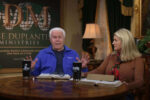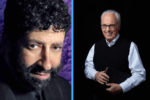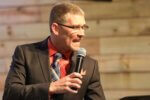It seems that no matter what season of life we are in, we want to be in a different one. God wants us to appreciate where we are.
Perhaps you remember The New Yorker cartoon in which two monks in robes and shaved heads are sitting side by side, cross-legged on the floor. The younger one, with a quizzical look on his face, is facing the older, who is saying: “Nothing happens next. This is it.”
That’s exactly what it means to live in the here and now. We aren’t waiting for something else to occur, we aren’t distracted by anything around us, and we aren’t trying to escape mentally to another time. We are “mindfully awake.” Paying attention. Savoring the moment for all it’s worth. We are fully alive!
I once heard Diane Sawyer say on television, “The most important thing in life is to pay attention”—and I would agree. But how often are we able to achieve that? Not often enough, unfortunately. Nevertheless, our richest times in life are those when we are completely present, consciously heightening our awareness because our journey has brought us here—and we choose not to miss it.
I feel this when I’m engaged in rich, meaningful conversation with an interesting person. Questions are enticing, listening is acute, and eye contact is direct. I love that; such focused attention makes me feel alive. I also experience this feeling when I’m alone in an art museum or lost in a good book.
When I’m all there—or rather, all here!—I never want the moment to end. It’s wonderful. It’s the “it” to which the wise old monk referred.
About a year after my mother died in 1971, my dad and I were invited to the wedding of a mutual friend. Daddy was living with my brother, Chuck, and his family, and I picked him up so we could go in my car. At 78 years old, Daddy wasn’t driving anymore.
Since we had plenty of time, I suggested we stop off for coffee at a place along the way where we knew a couple of the waitresses. There we sat, dressed to the nines and sipping coffee in a little short-order restaurant.
After a while it began to rain, and we decided to let the weather clear up before traveling on. We settled back in our chairs and talked about childhood—Dad’s and mine—and about Mother and his love for her through the 40 years they were married. I thanked him for being such a great dad to me and my two brothers.
When the rain became more intense, we gave up the idea of going to the wedding and nestled into one of the sweetest times my dad and I had ever had. We had always been close, but never more than that night. We were totally connected conversationally, not distracted by anything and absolutely in the moment.
Would that we were able to maintain that kind of connectedness all the time, with others as well as with ourselves. It’s hard, almost impossible. So often we want to be somewhere else. We look at the “now” we are in and have this illusion that if we could just inch or leap forward on the journey, our lives would be richer or better or more “together.” We don’t want to be here.
Why is this? Why are we so rarely satisfied? Were we simply programmed to be this way, or is it that we just don’t know ourselves or God well enough to recognize what truly satisfies?
JOURNEY OF SELF-DISCOVERY As I look back over my life, I see that there are many times when I wasn’t satisfied; I couldn’t live fully in the moment. I was looking for the next thing to bring me fulfillment and, of course, I wanted that fulfillment to be permanent.
One of the hardest periods in my life was in the mid-1980s. It ultimately became one of the most transforming times because I was willing to attune myself fully to the here and now—even though it was painful. It turned out that my own discomfort contained critical information that formed a pathway to the next leg of my journey. But it was very hard to be as vulnerable as I needed to be to see the real roadblock.
In August of 1985 I experienced some heartbreaking misunderstandings with close friends. At the same time, I was trying to make a major decision—whether or not to take early retirement from Mobil Oil Corp. because of an impending collision between my “real” job and lots of speaking engagements.
I eventually decided to turn over all the turmoil to God. As days and weeks passed, it seemed as though I heard in my head, “Write things down.” So, I did.
The first thing I wrote was a letter to myself, in which I poured out all the feelings I had been dealing with for months or, perhaps unknowingly, for years. I cried out to God about the loneliness I felt and also about the anger, fear, regret, inadequacies, fault-finding, dread and despair.
When I finally stopped writing, it was as if the burden had started to lift. Everything that had been inside was now outside. I had dumped it all on the only One who could handle the whole truckload.
I soon saw positive things happening. For one thing, I came to the realization that my most annoying problem was me.
How could I be my own problem? Simple: I wanted control—of everything—and I resented the fact that God wanted control, too. My desire for control outweighed my desire for connectedness, even with Him.
I felt lonely because I had attached all the desires of my heart to a tiny circle of friends and companions from whom I wanted all my needs met, and they just happened to have lives of their own! I had completely taken my eyes off the big picture of what God had in store for me.
I didn’t want the life I was living; I wanted some pie-in-the-sky existence that wasn’t possible. For some reason I was holding out for it before I would permit myself to be happy where I was.
The second thing I wrote, on September 1, 1985, was a list of goals: all the things I felt were important in life—for now and for later. My first objective was to determine if and when I could retire from Mobil Oil. Since the list was figured on a three-year plan, I aimed for a September 1, 1988, retirement date.
My list included other goals as well—large and small—each with its own objective to stretch me and enlarge my borders. Nothing was too “out there,” but all the goals required discipline—something I was lacking when I felt so frightened.
After the list was completed, I noticed it was entirely about things, not people. Hmmm, it seemed I was still disconnected from my deepest need.
The third thing I did was what rounded me toward home plate. I had been to a Mobil management meeting at which I came across a thought-provoking article on plotting your lifeline in a magazine called the Executive Female. It included instructions for charting one’s life journey, including both personal and career experiences, on a graph, using plus signs for positive events and minus signs for negative or painful events.
I began plotting, and some interesting data quickly emerged.








Leave a Comment
You must be logged in to post a comment.